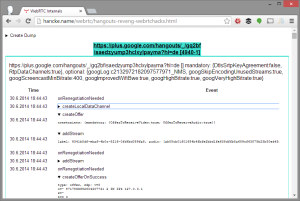Update: Philipp continues to reverse engineer Hangouts using chrome://webrtc-internals. Please see the bottom section for new analysis he just put together in the past couple of days based on Chrome 38. As initiators and major drivers of WebRTC, Google was often given a hard time for not supporting WebRTC in its core collaboration product. This […]
Search Results for: simulcast
Plug-in free or free plug-in? Q&A with IE & Safari WebRTC plug-in maker Alex Gouaillard
One of the most vexing challenges for WebRTC developers is “what do you do with IE and Safari?” Do you ignore them? Tell your users to use something else? Can you even tell them what to do? Maybe you fall back to flash? There are no easy answers and WebRTC is supposed to be easy, […]
WebRTC beyond one-to-one communication (Gustavo Garcia Bernardo)
WebRTC and its peer-to-peer capabilities are great for one-to-one communications. However, when I discuss with customers use cases and services that go beyond one-to-one, namely one-to-many or many-to-many, the question arises: “OK, but what architecture shall I use for this?”. Some service providers want to reuse the multicast support they have in their networks (we […]
WebRTC Video Codec Debate: Is There No End in Sight? (Chris Wendt)
As detailed in previous posts on webrtcHacks, the Internet Engineering Task Force (IETF) has worked for the past few years to standardize the “on-the-wire” protocols that make up the WebRTC engine. It is coming up on 3 months since IETF 88 in Vancouver, where the IETF was to have settled the matter of a mandatory-to-implement […]
WebRTC Video Codec Decision is… NO DECISION
As we discussed in previous posts, the IETF is meeting this week in Vancouver. Lots of interesting discussing including two sessions for the RTCWeb WG; the agenda for the two sessions can be found here. The first session, which was held on Monday, was mainly about updates on the JSEP (Javascript Session Establishment Protocol) specification, […]






